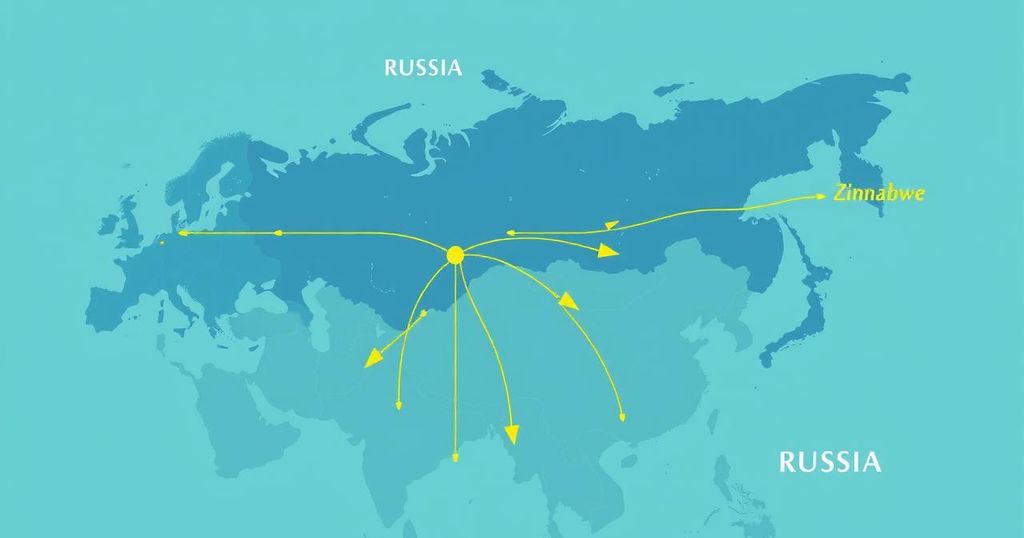This article analyzes the evolving diplomatic relationship between Russia and Zimbabwe, highlighting significant meetings, bilateral cooperation initiatives, and the importance of practical actions to translate agreements into tangible outcomes amid economic challenges and geopolitical dynamics.
In recent years, Russia and Zimbabwe have strengthened their diplomatic ties, culminating in a significant meeting on March 6, 2025, between Foreign Minister Sergey Lavrov and Zimbabwe’s newly appointed Foreign Minister, Amon Murwira. This meeting emphasized the bilateral cooperation established by previous ministers and underscored Murwira’s mandate to enhance relations amid a complex geopolitical landscape, acknowledging the relevance of ongoing regional and international developments affecting both countries.
During a joint media conference, Lavrov highlighted the fundamental principles of equality and mutual respect in Russia-Zimbabwe relations. He reiterated President Emmerson Mnangagwa’s dedication to deepening partnerships based on earlier agreements with President Vladimir Putin and referred to discussions from the St Petersburg International Economic Forum in June 2024, which prioritized extensive cooperation across multiple sectors.
The agenda outlined by Lavrov included the enhancement of trade and economic agreements with a focus on sectors like geological exploration, mineral and nuclear energy, agriculture, and information technologies. Cultural cooperation was also notable, with Russia providing 125 scholarships annually for Zimbabwean students and a growing enrollment in online Russian language courses through the Centre for Open Education in Zimbabwe.
Regional collaboration has evolved, particularly with emerging relations between Zimbabwe and Tatarstan, alongside cooperation agreements involving various Russian regions. This regional engagement, along with Zimbabwe’s pivotal role in the Southern African Development Community (SADC), highlights its active support in conflict resolution within the continent, especially regarding the Democratic Republic of the Congo, further supported by Russian initiatives aimed at stabilizing conflict zones across Africa.
However, challenges remain in the Russia-Zimbabwe partnership, particularly given Zimbabwe’s economic difficulties. The country actively seeks foreign investment to revitalize its infrastructure, agriculture, and industry. Despite historical ties and mutual support against Western sanctions, the pursuit of effective foreign investment remains a critical objective for Zimbabwe’s government.
Reports indicate some setbacks in bilateral initiatives, such as Russia’s withdrawal from a $3 billion platinum project initially signed in 2014. While humanitarian efforts from Russia, including grain supplies to Zimbabwe, demonstrate goodwill, it is juxtaposed with Belarus’s active contributions in agricultural aid and mechanization programs.
The need for pragmatic actions to solidify Russia’s influence in Zimbabwe is underscored by public calls from political leaders. Zimbabwean officials stress the importance of translating diplomatic dialogue into tangible outcomes. Speaker Jacob Mudenda pointed out that while engagements have strengthened diplomatic ties, concrete actions are essential to manifest the geopolitical partnerships discussed in various summits, including strategies laid out in previous Russia-Africa forums.
Ultimately, economic cooperation, capability building in defense and security, and a commitment to sustained engagement will influence the future of Russia-Zimbabwe relations as both countries navigate their place in a changing geopolitical environment.
In summary, the Russia-Zimbabwe relationship is marked by ongoing diplomatic initiatives aimed at enhancing bilateral ties across various sectors, such as trade, humanitarian aid, and cultural exchange. While significant opportunities exist for cooperation, both nations must work towards addressing the economic challenges that hinder the realization of their strategic partnerships. Concrete actions must replace rhetoric to strengthen this relationship amid a complex geopolitical landscape, ensuring that mutual benefits are achieved.
Original Source: moderndiplomacy.eu






